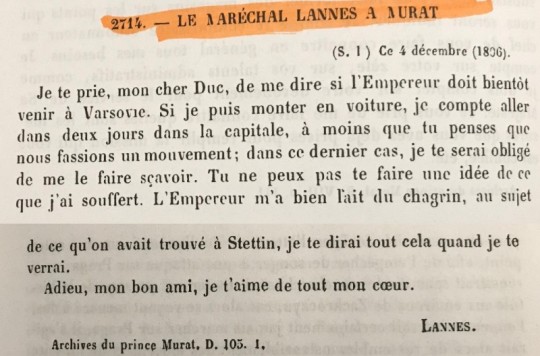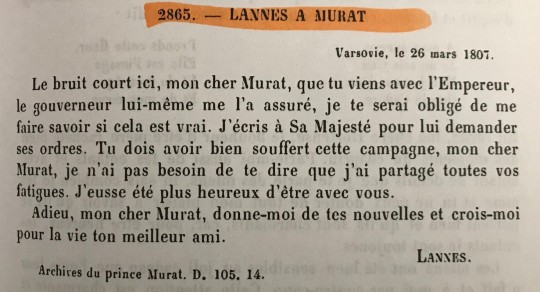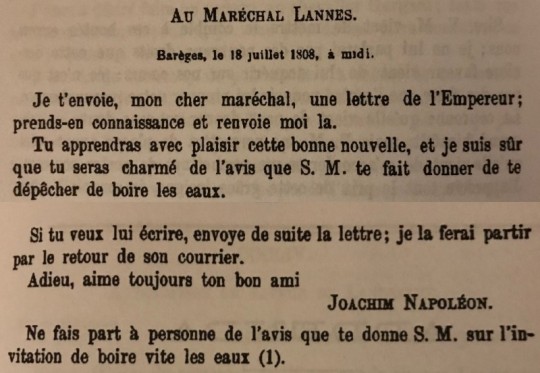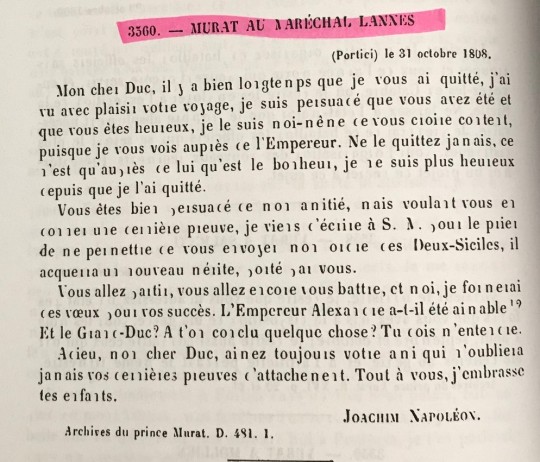#seen his shadow more than 100 times and hasn't seen it 18 times
Explore tagged Tumblr posts
Text
On the Murat/Lannes relationship
Napoleonic history is a tangled web. In the relatively short amount of time (three years-ish) since it first ensnared me, I've lost count of all the narratives/anecdotes/random tidbits I've come across in one source that have ended up being contradicted in another. I feel better about not always knowing what to believe when I see professional historians tripping over the facts themselves--like Michael Broers, in the first volume of his overall amazing trilogy-in-progress on Napoleon, referring to the story about Eugène de Beauharnais asking Napoleon for his father's sword back, as a myth "fabricated by Eugène and Hortense, after Napoleon's fall," when Napoleon himself recounted the story on Saint Helena. The truth is, this subject is just so vast it's impossible to get everything right 100% of the time.
And it doesn't help that a lot of what has come down over the years and become "common knowledge" on the subject often derives from memoirs written to push certain agendas, to fashion narratives, and to defend (and destroy) reputations.
Napoleon's marshals grabbed my interest right off the bat--Murat in particular--and I grabbed up every book I could find early on, with zero idea of which ones were credible or outdated. And some of them were old--the first Murat biography I read (by Atteridge) was from before all eight volumes of his available correspondence had even been published. The first book on the marshals I read was from 1934 (by Macdonell); the next (by Delderfield) was from the 60s. They were all good introductory reading but left me with a lot of ideas/assumptions that I ended up abandoning later on as I delved more into the primary sources.
One of these is the "Murat and Lannes hated each other" narrative.
I can't say beyond a shadow of a doubt that Laure Junot's infamous memoirs are entirely to blame, but I'm sure they definitely contributed to mainstreaming this particular narrative (among others). The Duchess d'Abrantès despised both Joachim and Caroline Murat, and devoted ample space in her memoirs to making them look as heinous (and universally disliked) as possible. The professional rivalry between Lannes and Murat--which legitimately did exist, at least early on--was blown out of proportion, and future historians gleefully piggybacked on it because drama sells books. And so we end up with excerpts like this in Delderfeld's Napoleon's Marshals:
The two future marshals, who already detested one another, were laid side by side in the hospital and Lannes must have taken full advantage of the fact that he could insult his rival with impunity, for Murat's jaw had been shattered by a pistol shot and his face was swathed in bandages. [2002 edition, page 51]
Again, I don't deny there was an early professional rivalry between the two, deliberately exacerbated by Napoleon, who delighted in this sort of thing. Marbot, who served under Lannes, relates the following:
General Bonaparte, when on his way to assume the command of the Army of Italy in 1796, took as his senior aide-de-camp Murat, whom he had just promoted to colonel, and for whom he had a great liking. Having, however, in the first actions noticed the military capacity, zeal, and courage of Lannes... he granted to that officer an equally large share of his esteem and friendship, thus exciting Murat's jealousy. When the two colonels had become generals of brigade, Bonaparte was accustomed, on critical occasions, to entrust to Murat the direction of the cavalry charges and put Lannes in command of the reserve of the grenadiers. Both did splendidly, and the army had nothing but praise for either. But between these gallant officers there grew up a rivalry which, if the truth must be told, was not at all displeasing to the commander-in-chief, as tending to stimulate their zeal and their desire of distinction. He would extol before Murat the achievements of General Lannes, and enlarge in Lannes' presence on the merits of Murat. [Memoirs of the Baron de Marbot, 1903, page 336]
From this early rivalry, we are led to believe that Lannes and Murat hated each other unhappily ever after. As "proof" of this we are given the occasional heat-of-the-moment blowup during later campaigns.
But the narrative starts to melt away when you look at their personal correspondence.
When I first started diving into Murat's correspondence after my obsession took hold, I was fairly shocked when I read some of the letters between him and Lannes and saw so many marks of affection--and frequent use of the informal tu, used between close friends and intimates, instead of the formal vous. I’ve seen this spun, in order to uphold the Lannes Hated Murat™ narrative, as Lannes just doing it to nettle Murat by being blatantly disrespectful or some such nonsense. I don’t buy that take, personally.
Some of the letters/excerpts (with translations following each):

"I see with pleasure that Blücher and the Duke of Weimar will not escape you. Be sure that you will never have as much glory as I want for you and that I love you a thousand times more than you love me. I will never cease to seize every circumstance of giving you new proofs of it. A thousand and thousand times your friend."
Excerpt in Lannes' own hand from a letter to Murat dated 1 December 1806:

"I give you my word, my dear friend, that the soldier is in the greatest misery, make sure that food is sent to us from Warsaw. Your best friend, Lannes."

"I pray you, my dear Duke, tell me if the Emperor must come soon to Warsaw. If I can get in a carriage, I count on going in two days to the capital, unless you think we're making a movement; in this latter case, I will be obliged to you to let me know it. You can't have an idea of what I've suffered. The Emperor gave me much grief, on the subject of what was found in Stettin, I will tell you all that when I see you. Farewell, my good friend, I love you with all my heart."

"The rumor runs here, my dear Murat, that you are coming with the Emperor, the governor himself assures me of it, I will be obliged to you to let me know if this is true. I'm writing to His Majesty to request his orders. You must have suffered much this campaign, my dear Murat, I have no need to tell you that I've shared all your fatigues. I would have been happier to be with you. Farewell, my dear Murat, give me your news and believe me for life your best friend."
In July of 1808, recovering from a severe illness that struck him in Spain, Murat went to "take the cure" in Barèges. He spent a few days there with Lannes and Ney, and was able to share the news with them that Napoleon had just made him the King of Naples. He writes the following letter to Lannes while in Barèges:

"I'm sending you, my dear marshal, a letter from the Emperor; read it and send it back to me. You will learn this good news with pleasure, and I am sure that you will be delighted with the advice that His Majesty gives you to hurry and drink the waters. If you want to write him, send the letter immediately; I will send it by the return of his courier. Farewell, love always your good friend."
After their brief stay at Barèges, Murat accompanies Lannes to Lannes' chateau near Lectoure, and stays as his guest, to finish his recuperation through the end of July. Murat, months later in Naples, writes to his friend to express his gratitude for Lannes' care of him during his illness (this one's a bit hard to read, sorry):

"My dear Duke, it has been a long time since I left you, I was glad to see your journey, I am persuaded that you were and are happy, I believe you are happy myself, since you are with the Emperor. Never leave him, it is only with him that there is happiness, I am no longer happy since I left him. You are persuaded of my friendship, but wanting to give you a recent proof of it, I just wrote to His Majesty to beg him to permit me to send you my Order of the Two Sicilies, it will acquire a new merit, worn by you. You are going to leave, you are going to fight again, and me, I will make wishes for your success. Was the Emperor Alexander friendly? And the Grand Duke? Did you conclude anything? You must tell me. Farewell, my dear Duke, love always your friend who will never forget your recent proofs of attachment. All yours; I kiss your children."
So in summary: I believe that Murat & Lannes were professional rivals early in their careers, but that their rivalry has been blown way out of proportion because drama makes good copy, and I'm pretty firmly convinced that they were a good deal closer than has commonly been believed/written. At any rate, I'm glad to be able to show another side of their relationship that hasn't gotten nearly as much attention as Lannes referring to Murat as an ass and a strutting rooster or whatever it was in Laure Junot's memoirs. If you've made it this far, thanks for reading; this ended up being a good deal longer than I originally envisioned it.
[All the letters above come from Volumes 4-7 of Lettres Et Documents Pour Servir À l'Histoire de Joachim Murat, except for the 18 July 1808 letter, which is from Albert Lumbroso’s Correspondance de Joachim Murat. I take full blame for any flaws in the translations, which are entirely my own.]
150 notes
·
View notes
Link
Check out @TinaJellyBean’s Tweet.
#groundhog day#prediction 2017#six more weeks of winter#happy thursday#punxsutawney phil sees his shadow#gobblersknob#pennsylvania#131st celebration#weather#bill murray#february 2nd#groundhog day movie#weather prognosticating groundhog#seen his shadow more than 100 times and hasn't seen it 18 times#tina jellybean#ttss1114#tjs-photography#twitter#tweet#art#photos#officiant#gif#event#midwest#tradition stems from candlemas an ancient european celebration#midway between winter solstice and spring equinox#status#ron ploucha#nature
0 notes